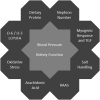Developmental Programming of Renal Function and Re-Programming Approaches
- PMID: 29535992
- PMCID: PMC5835132
- DOI: 10.3389/fped.2018.00036
Developmental Programming of Renal Function and Re-Programming Approaches
Abstract
Chronic kidney disease affects more than 10% of the population. Programming studies have examined the interrelationship between environmental factors in early life and differences in morbidity and mortality between individuals. A number of important principles has been identified, namely permanent structural modifications of organs and cells, long-lasting adjustments of endocrine regulatory circuits, as well as altered gene transcription. Risk factors include intrauterine deficiencies by disturbed placental function or maternal malnutrition, prematurity, intrauterine and postnatal stress, intrauterine and postnatal overnutrition, as well as dietary dysbalances in postnatal life. This mini-review discusses critical developmental periods and long-term sequelae of renal programming in humans and presents studies examining the underlying mechanisms as well as interventional approaches to "re-program" renal susceptibility toward disease. Clinical manifestations of programmed kidney disease include arterial hypertension, proteinuria, aggravation of inflammatory glomerular disease, and loss of kidney function. Nephron number, regulation of the renin-angiotensin-aldosterone system, renal sodium transport, vasomotor and endothelial function, myogenic response, and tubuloglomerular feedback have been identified as being vulnerable to environmental factors. Oxidative stress levels, metabolic pathways, including insulin, leptin, steroids, and arachidonic acid, DNA methylation, and histone configuration may be significantly altered by adverse environmental conditions. Studies on re-programming interventions focused on dietary or anti-oxidative approaches so far. Further studies that broaden our understanding of renal programming mechanisms are needed to ultimately develop preventive strategies. Targeted re-programming interventions in animal models focusing on known mechanisms will contribute to new concepts which finally will have to be translated to human application. Early nutritional concepts with specific modifications in macro- or micronutrients are among the most promising approaches to improve future renal health.
Keywords: blood pressure; early nutrition; kidney development; nephron number; re-programming intervention; renal sodium transport; renin–angiotensin–aldosterone system.
Figures
References
-
- Nüsken E, Nüsken K-D, Dötsch J. Diet and epigenetic alteration of renal function. In: Patel V, Preedy V, editors. Handbook of Nutrition, Diet, and Epigenetics. Cham: Springer International Publishing; (2017). p. 1–20.
Publication types
LinkOut - more resources
Full Text Sources
Other Literature Sources


